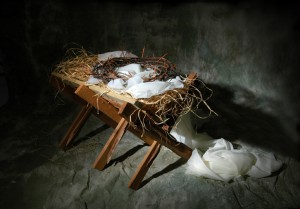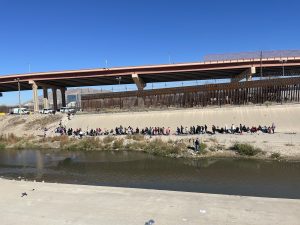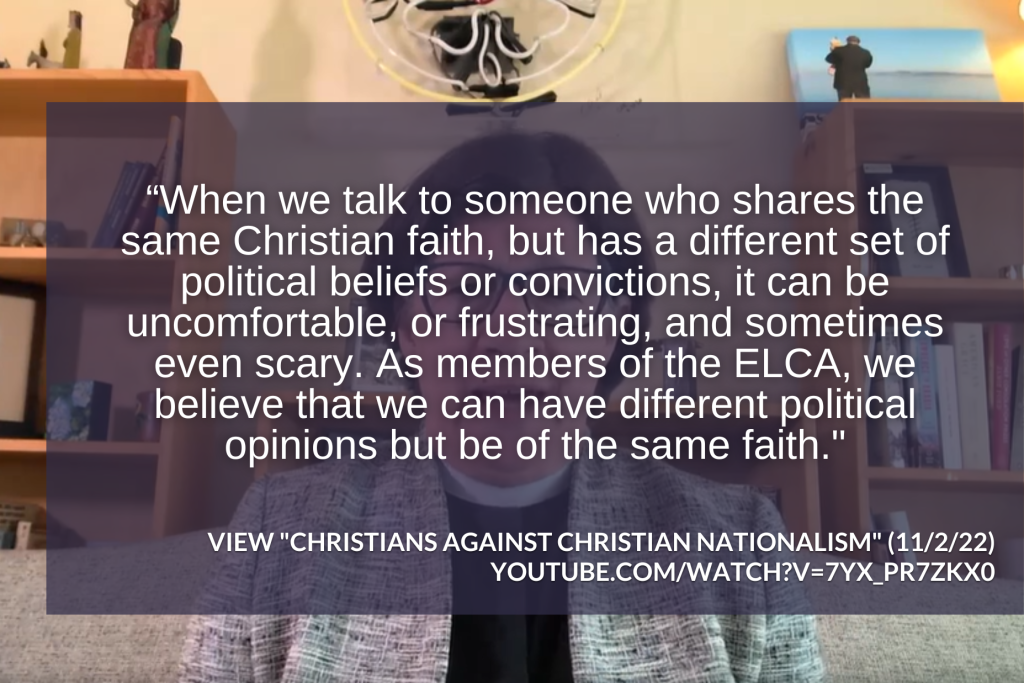Following are updates shared from submissions of the Lutheran Office for World Community and state public policy offices (sppos) in the ELCA Advocacy Network this month. Full list and map of sppos available.
U.N. | CALIFORNIA | COLORADO | NEW MEXICO | OHIO | PENNSYLVANIA | WASHINGTON | WISCONSIN |
Lutheran Office for World Community (LOWC), United Nations, New York, N.Y. – ELCA.org/lowc
Christine Mangale, Director
World AIDS Day 2022
- This year, World AIDS Day 2022 was marked under the theme Equalize, a call on global leaders and all peoples of goodwill to recognize and address inequalities holding back progress in ending aids. It is critical to equalize access to essential HIV services particularly for children and key populations and their partners.
- On Thursday, Dec. 1, 2022, an interfaith World AIDS Day service was held under the theme: “The impact of HIV among the marginalized within the marginalized.” Planning partners of the service included leadership from the U.S. Faith & AIDS Coalition, Samuel DeWitt Proctor Conference, HIV Vaccine Trials Network, and the Lutheran Office for World Community.
- Ensuring that all people living with HIV have access to HIV treatment, testing and prevention services must continue to be the focus of our HIV and AIDS ministries both in the U.S. and abroad. We encourage Lutherans everywhere to support efforts by governments, churches and other partners to provide resources towards testing, treatment, care and prevention services.
- We call upon President Biden and Congress to increase funding to PEPFAR; the Global Fund to fight AIDS, Tuberculosis and Malaria; and domestic programs that provide preventive care and treatment in the United States. We also urge U.N. member states to reform laws, policies and practices to tackle the stigma and exclusion faced by people living with HIV and by key and marginalized populations, and to support the proposed target of ending the epidemics of AIDS, tuberculosis and malaria as articulated in the United Nations 2030 Agenda for Sustainable Development.
California
Lutheran Office of Public Policy – California (LOPP-CA) – lutheranpublicpolicyca.org
Regina Banks, Director
With the start of December, new and returning California legislators were in Sacramento on December 5th to be sworn in. This new legislature is the most diverse in California history, seeing record numbers of women and LGBTQIA+ people elected. Of note, a few races remain too close to call, and the deadline to certify results is not until December 16th.
Additionally, a special session in the legislature was opened to discuss a proposal headed by Governor Newsom that would place a cap on the profit margin of oil companies and fine companies that exceed the limit. The stated goal of this proposal is to prevent price-gouging by oil companies, as California has seen vastly higher gasoline prices for consumers than other states. More details have yet to be flushed out in this proposal, however, including whether any fines will be considered a tax and whether California residents will receive any compensation from such fines.
For a look at the California ballot proposition results from the midterm elections, and to compare the results to what our Policy Council recommended, check out our updated voter guide here.
Colorado
Lutheran Advocacy Ministry Colorado (LAM-CO) – lam-co.org
Peter Severson, Director
PREPARING FOR SESSION: The Colorado General Assembly will return on Monday, January 9, 2023. Policy advocates across the state are preparing for the beginning of session, which may feature significant bills to address housing supply, the cost of living, disaster preparedness, gun violence, and other critical issues facing Colorado. Lutheran Advocacy will be there from opening gavel to close, and we invite you to join us in lifting our voices for the sake of critical issues affecting our neighbors. Learn more at www.lam-co.org
New Mexico
Lutheran Advocacy Ministry New Mexico (LAM-NM) – lutheranadvocacynm.org
Kurt Rager, Director
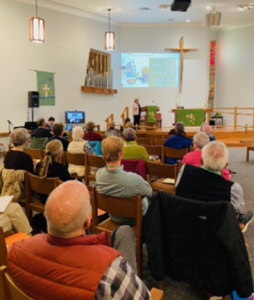 A long-standing annual event for Lutheran Advocacy Ministry – New Mexico(LAM-NM) has been its annual Fall Advocacy Conference. The event is highlighted by keynote speakers connected to key policy areas focused on by LAM-NM, and offers various workshops on topics such as how to advocate on priority issues with state legislators. The Covid pandemic caused a two-year pause for the conference. Naturally, there was much enthusiasm when the decision was made to hold a hybrid event in November this year.
A long-standing annual event for Lutheran Advocacy Ministry – New Mexico(LAM-NM) has been its annual Fall Advocacy Conference. The event is highlighted by keynote speakers connected to key policy areas focused on by LAM-NM, and offers various workshops on topics such as how to advocate on priority issues with state legislators. The Covid pandemic caused a two-year pause for the conference. Naturally, there was much enthusiasm when the decision was made to hold a hybrid event in November this year.
Advocates from across New Mexico gathered in-person at All Saints Lutheran Church, Albuquerque, as well as online on November 19th. In attendance were not only ELCA congregations but also, in a reflection of historically strong ecumenical participation and support, participants included Episcopalians, Presbyterians, Catholics, Methodists, Mennonites and more. Alongside keynote speakers and workshops, the day-long event included small and large group discussions, and of course–the key to success at Lutheran events–coffee, snacks and a meal!
As we continue to learn and adapt our advocacy ministry during a global pandemic, a primary focus of LAM-NM is to continue to nurture and grow its congregation-based advocacy network, as well as extend it to our on-going advocacy partnership with the New Mexico Conference of Churches. Lilly Irvin-Vitella, a highly respected advocate, organizer, and consultant, led participants through two interactive experiences focused on building grassroots advocacy groups in congregations and on how to successfully hold conversations on topics that often become divisive. Sherry Hooper, who leads the primary food bank covering northern NM, shared with participants a proposal to end hunger by addressing poverty in the city of Santa Fe that could be used as a state-wide model. Finally, Denali Wilson, an attorney with the ACLU, focused participant’s attention on juveniles convicted of murder and serving life sentences in NM and on the move to remove the mandatory life sentence without a parole hearing option from judges during sentencing. LAM-NM will lead the faith community’s advocacy during the upcoming legislative session that begins in January 2024.
Ohio
Deacon Nick Bates, Director
On November 29th, 30 faith leaders from across Ohio gathered at Trinity Episcopal Church in Columbus, across from the Ohio Statehouse, to begin Advocacy in Advent. During a season of hope and anticipation, we prepared and sent advocates to two dozen legislative meetings to discuss important issues including:.
– Investments needed in affordable housing ($308 million) and Ohio’s foodbanks ($90 million)
– Criminal Justice transformation (SB 288 passed the Senate with a 27-2 vote later that week!)
– Protecting LGBTQIA+ youth’s access to mental and physical healthcare. (HB 454 was removed from the legislative agenda because of a strong push from community advocates! However, further discriminatory measures are still being considered against trans and non-binary youth. Our director wrote a letter to the editor of the Columbus Dispatch on this issue that can be found here.)
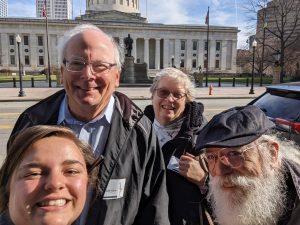
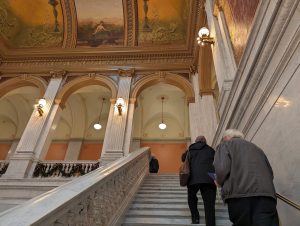
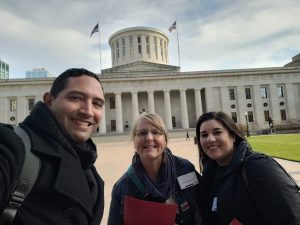
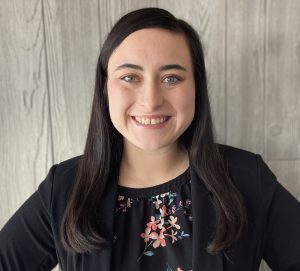
We are also pleased to welcome Jillian Russell to the Hunger Network as our ELCA Hunger Advocacy Fellow! Russell comes to us from the Northwest Ohio Synod and is a recent graduate of Capital University. We look forward to working closely with her over the next year to strengthen our advocacy here in Ohio!
Pennsylvania
Lutheran Advocacy Ministry – Pennsylvania (LAMPa) lutheranadvocacypa.org
Tracey DePasquale, Director
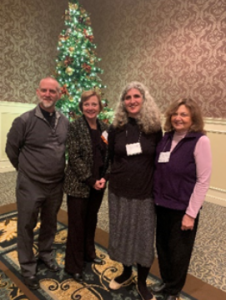
The Rev. Matthew Best, LAMPa chair; LAMPa Director Tracey DePasquale, the Rev. Schaunel Steinnagel and the Rev. Violet Little, co-pastors at The Welcome Church, lifted up the voice of unsheltered neighbors at the PA Homes Within Reach Conference.
LAMPa wrapped up 2022 with a focus on housing and homelessness as hundreds of thousands of Americans face winter without a safe and reliable place to call home.
Staff and Policy Council members continued outreach to fellow Lutherans across the country and the Commonwealth in support of the Homeless Remembrance Blanket Project on Dec. 21 in Washington, D.C. The project, which features blankets from every state spread on the lawn of the Capital in remembrance of those who died unsheltered in the United States in 2022, was inspired by a similar event in Carlisle, Lower Susquehanna Synod, led by the Rev. Matthew Best, LAMPa’s Policy Council Chair.
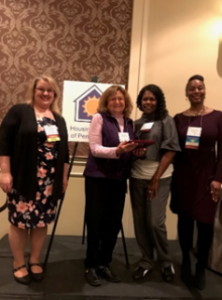
The Housing Alliance of PA recognized the Rev. Violet Little with the Frontline Leader Award. The ministry of The Welcome Church is supported by ELCA World Hunger.
Lutherans and others have been busy quilting, crocheting, and knitting blankets for the art installation and press event. Approximately 1,000 blankets are expected to arrive from each state in the country and be distributed afterward to those in need. LAMPa is assisting ministries with unsheltered neighbors to connect with ELCA Witness in Society to host a site visit with members of Congress as a follow up to the event. Email us to learn more.
One of those sites will be The Welcome Church, whose founder, the Rev. Violet Little, was recognized with the Frontline Leader Award at the state’s Homes Within Reach Conference. More than 800 attended the conference, hosted by the Housing Alliance of PA, of which LAMPa is a member. The award recognizes those whose work inspires and uplifts and puts the needs of those they serve front and center. Learn more.
Washington
Faith Action Network (FAN) – fanwa.org
Elise DeGooyer, Director
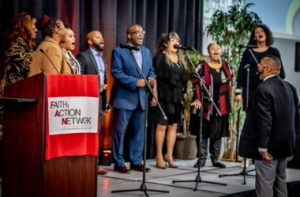 This past month, Faith Action Network(FAN) hosted its first Annual Hybrid Dinner celebrating together the theme, Pathways to Solidarity. We experienced so much solidarity as we helped keep FAN moving forward into a new year of advocacy and organizing for justice. The Northwest African American Museum Cultural Ensemble/ACE gospel choir added incredible harmonies and a joyful noise. FAN Board Member Aneelah Afzali of MAPS(Muslim Association of Puget Sound)-AMEN raised the energy in the room with her passion for solidarity as faith in action! You can still enjoy the program archived on our YouTube page (program begins at the 30 minute mark), and view select photos from the evening on our Facebook page.
This past month, Faith Action Network(FAN) hosted its first Annual Hybrid Dinner celebrating together the theme, Pathways to Solidarity. We experienced so much solidarity as we helped keep FAN moving forward into a new year of advocacy and organizing for justice. The Northwest African American Museum Cultural Ensemble/ACE gospel choir added incredible harmonies and a joyful noise. FAN Board Member Aneelah Afzali of MAPS(Muslim Association of Puget Sound)-AMEN raised the energy in the room with her passion for solidarity as faith in action! You can still enjoy the program archived on our YouTube page (program begins at the 30 minute mark), and view select photos from the evening on our Facebook page.
FAN also recently welcomed in a new part-time Spokane organizer, Jeff Debray. Jeff played a major part in orchestrating our Spokane location for our annual dinner. Jeff brings his political organizing skills to the legislative session that will begin on January 10, 2023.
We are now preparing for the 2023 legislative session. We will be finalizing our priorities this month. We also will be hosting two legislative training sessions in January, as well and two advocacy days, one in Spokane and one in Olympia, to put our Faith into Action.
Wisconsin
Lutheran Office for Public Policy – Wisconsin (LOPPW) loppw.org
The Rev. Cindy Crane, Director
ANNUAL LOPPW POLICY COUNCIL MEETING: We explored the possibility of continuing our current priorities: hunger, care for God’s creation, anti-sex trafficking, immigration, and youth justice, with the possibility of expanding one of our priorities. We also decided that the council will, in our education and resource-building, emphasize one priority at a time each year. We decided to focus on care for God’s creation in 2023.
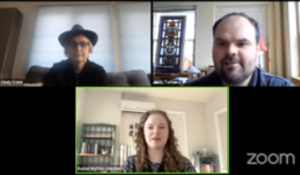 WEDNESDAY NOON LIVE: Our co-host, Rev. Andy Twiton, sought out connections with young adults who are doing faith-based social justice work as part of their career or as volunteers. He was directed to Rachel Wyffels, former hunger advocacy fellow for Lutheran Advocacy Minnesota. Rachel discussed her work with Abide and offered keen insight into what a number of young adults are passionate about in their advocacy and voting. We will invite former LOPPW hunger advocacy fellow, Kelsey Johnson, next month.
WEDNESDAY NOON LIVE: Our co-host, Rev. Andy Twiton, sought out connections with young adults who are doing faith-based social justice work as part of their career or as volunteers. He was directed to Rachel Wyffels, former hunger advocacy fellow for Lutheran Advocacy Minnesota. Rachel discussed her work with Abide and offered keen insight into what a number of young adults are passionate about in their advocacy and voting. We will invite former LOPPW hunger advocacy fellow, Kelsey Johnson, next month.
RETURNING 17 YEAR-OLDS TO THE YOUTH JUSTICE SYSTEM: Our coalition received good news about two Republican legislators who were willing to champion this bill. We are strategizing how to build public support when the bill comes out. Recently, Lutheran Office for Public Policy in Wisconsin(LOPPW) director, the Rev. Cindy Crane, led a new workshop on this issue for the first time!
CARE FOR GOD’S CREATION & HUNGER: LOPPW and Faith in Place have a location for our spring advocacy day and will soon make an announcement with details.
YOUTH: Our team of representatives from six synods are almost settled on an exact location for our April youth advocacy gathering.





